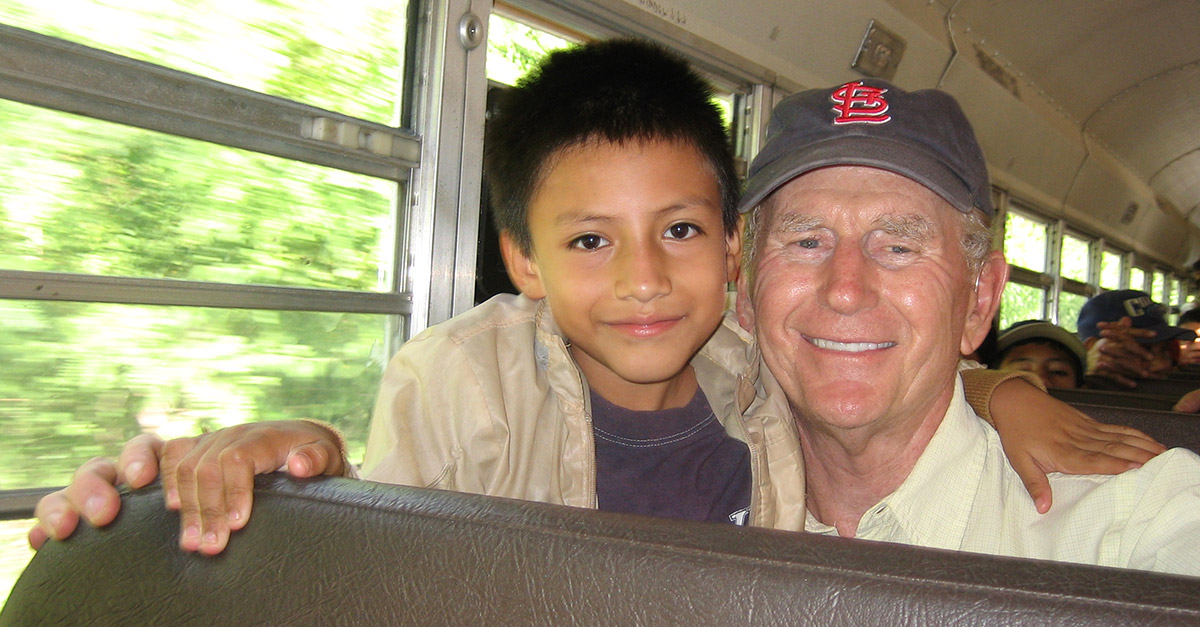“Don’t walk behind me; I may not lead. Don’t walk in front of me; I may not follow. Just walk beside me and be my friend.” – Albert Camus
We only know what we know; it’s for what we don’t know, that we search.
I knew about the shortage of houses in El Salvador but what I didn’t know was the culture of the people in this small country with fewer square miles than Massachusetts.
My research before the first trip had been purposely slim. Like all things, there are different sides, and varying points of view, so I wanted my heart and mind to stay open on this journey.
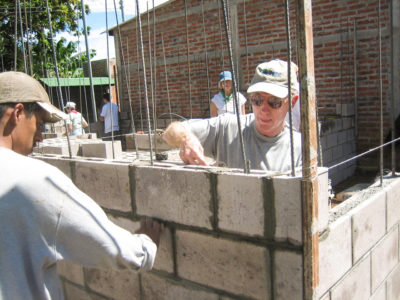
I knew about Habitat homes in Charlotte, I’d been working on them for years, but Habitat for Humanity in El Salvador builds differently. Their small homes of 421 square feet are made of reinforced cinder block to withstand the earthquakes and hurricanes along its Pacific Coast. They are built by hand with help from the new owner and a crew of eager volunteers.
Our team from around the Southeast were to be the volunteers that week in 2005. Our job was to dig the foundations, carry the blocks, bend the rebar, and mix the cement. We’d eat lunch under a tree, then go back to work until it was time to ride the old school bus back to our non air-conditioned rooms for a quick nights sleep – then do it all again the next day.
The substandard housing, even the poverty, were what I expected. What I didn’t expect was the rich character of the people.
Doing without things I thought were necessary, even vital, like plenty of hot water for a shower, a stove for cooking that didn’t first need wood and a match, even toilets that flush without dumping water in the tank, seemed impossible to me.
Yet, it was as though in living without my essentials the Salvadorians had found more.
They had the things in life that really matter – like family and friendships and faith.
It was this strength of character and commitment to deeper relationships that kept me coming back.
The early years of my travel were fulfilling enough. I was helping build homes, but I would be sad when it was time to fly home.
Waving goodbye, for what I knew was the last time, meant not staying in touch, not watching the family settle into their new home, or being able to see the children grow and go off to school.
Those early goodbyes were too final.
I wanted to build relationships as strong as the houses.
Then, instead of a forever “goodbye,” we would lovingly say, “until next time.” But I didn’t know how to make that happen.
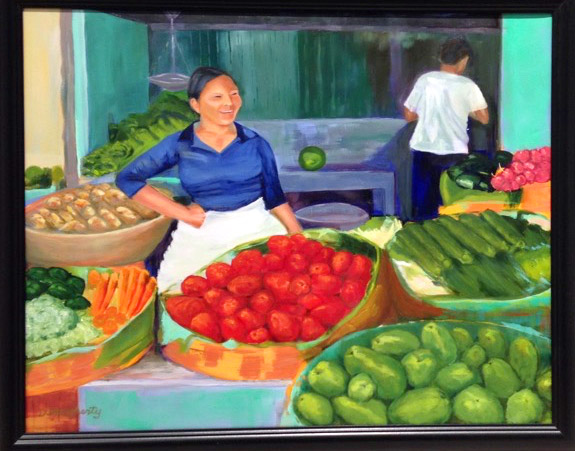
I have been blessed to travel to El Salvador many times. Often, my friend Donnie Daugherty was in my group.
She, like me, found inspiration in the spirit and hard work of the people there. On one occasion, she took a photo of a woman working at her market stand. It became a treasured snapshot .. and inspired her to create her own art.
Donnie now paints often and well, and remembers this woman selling vegetables on the street to earn a living for her family. This painting reminds me that we not only built walls, but also cherished memories.
Until fortunately, in 2007 Myers Park Presbyterian Church was looking for an international partner where our time and money could make a difference. With the help of Habitat El Salvador, the barrio of Getsemaní was chosen.
It’s a community of 138 families, near my friend Pastor Rodriguez in Ahauchapán. The Pastor was buying land nearby where he worked (and prayed) for a church to serve the people of the village.
This was the perfect match, now the new homes and my friendships could both be built on a rock.
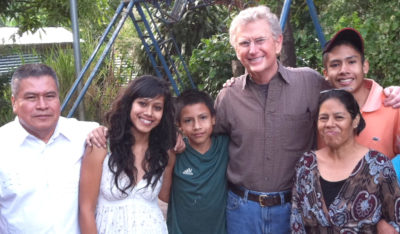
I met Pastor Rodriquez on Thursday of my first week there. Now, there will be a reunion!
“Strengthening the Getsemaní Community” was not born at a long board room table in Charlotte, but in a circle of white plastic chairs on a dirt floor under a tattered blue tarp.
The hopes of the people came in six dreams: decent housing, community health, microentrepreneurship, values education, community leadership, and cultural exchange.
Holistic visions are a big undertaking and need many hands and dollars, even for a tall steeple church like Myers Park. We would need (and wanted) help. It was in “asking” that I learned the meaning of the expression, “In my Father’s coat there are many pockets.”
Just as my church had not wanted to take over the planning, neither did we want to put up all the people or money. We wanted the local community to lead the way, with us at their side.
Our church’s investment got things started, but over half came from pockets all over El Salvador and the US. The faith community, and others, saw the benefit of building lasting relationships while giving life to the dreams of the community.
As Getsemaní grew, so did its people. They walked with their heads held high, with a new confidence, as they began to call on government and non-government offices to ask for help. These peasants were showing everyone how the welfare of the least was for the welfare of all.
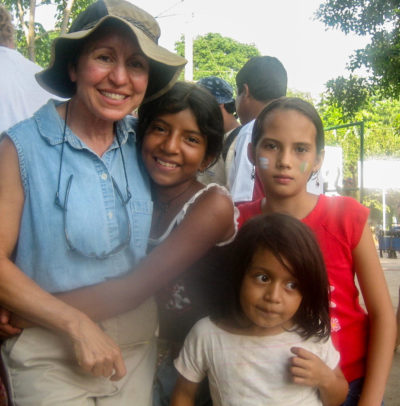 Today, we can travel to El Salvador and I will introduce you to my friends.
Today, we can travel to El Salvador and I will introduce you to my friends.
I’ll teach you to make pupusas by hand, just as Ana Maria taught me.
We’ll find hermano Juan and have him show us how to save orange seeds from our afternoon snack to plant near the fence for others to someday enjoy.
We’ll laugh with the children and have them teach us Spanish, as we share our English.
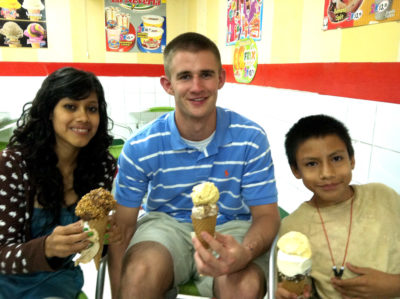 I’ll give you Yolanda Ardon’s mobil number at La Naveria so we can ask her to stay late if we want ice cream after eight. I’ll introduce you to Carlos at Hotel Casa Blanca, in the heart of Ahuachapán, even ask him to put you in the best room.
I’ll give you Yolanda Ardon’s mobil number at La Naveria so we can ask her to stay late if we want ice cream after eight. I’ll introduce you to Carlos at Hotel Casa Blanca, in the heart of Ahuachapán, even ask him to put you in the best room.
I’ll explain why I always put one of my shoes in the sink as a reminder not to drink the water.
It‘ll be fun to watch you come to love the people as I do. You’ll need to pack more questions than answers for this trip. Then maybe we will both understand Albert Camus when he said to, “… just walk beside me and be my friend.”
So that’s what I learned on my search; how there’s more to it than building a house or painting a wall in a strange country. I learned how the real value is found in the relationships that go on forever.
If you have made trips like mine, how did the immersion in a new culture change you? Can change happen here, at home, when you look with new eyes on your neighbors? Why is that so?
As always the conversation starts here.
“In the ordinary choices of every day we begin to change the direction of our lives.” – Eknath Easwaran
Epilogue
This video tells my story better than I. Take time for its message, and look for your face in the scenes. You’re in there – if not on this trip, maybe the next.

